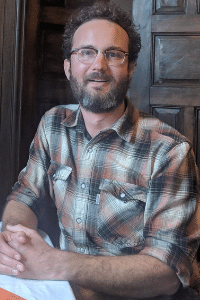
Meet Maine-eDNA: Andrew Rominger, New Faculty Hire

By Maine EPSCoR student writers, Jane Horovitz and Attis Bielecki with Marcella Silver
Prior to being hired as a new faculty member on Maine EPSCoR’s current Track-1 program, Maine-eDNA, Andrew Rominger conducted his Ph.D. research at the University of California Berkeley and postdoctoral research at the Santa Fe Institute. He was involved in a large project in Hawaii focused on terrestrial arthropods, where he extracted and analyzed environmental DNA (eDNA) from a large amount of raw data; similar to the process utilized by Maine-eDNA.
While Rominger will continue researching Hawaii’s fascinating islands, he is also working with data coming from Maine’s diverse coastal ecosystems for the Maine-eDNA program. In August, he relocated from New Mexico to Maine in order to join the program.
“I’m excited to work on any ecosystem that really presents good opportunities for asking specific questions about ecology and evolution,” Rominger said.
For Rominger, the Maine-eDNA program presents an opportunity to take what he learned from working with large, messy data sets in Hawaii during his Postdoctoral research, and utilize it to help draw conclusions about ecological and evolutionary processes.
“The Maine-eDNA program sounded like the perfect type of initiative that really matched my experience and ambitions in terms of using this next-generation, sequencing-enabled biodiversity approach,” Rominger said.
One of the big questions Rominger has is: what are the various ways in which biological assemblages, also known as ecological communities, can reach equilibrium or be pushed out of equilibrium?
Equilibrium is the consistent state an ecosystem has the tendency to return to in time. Rominger is particularly interested in two potential forces which could cause an assemblage to reach “non-equilibrium.” One force is anthropogenic pressure, which refers to the impact we, as humans, have on ecosystems. Another is the evolutionary history underlying all cohabitating species that could, in some way, prevent an assemblage from reaching equilibrium.
“A classic example is predator and prey, or herbivore and their food,” Rominger explains. “Interactions between those groups of organisms can lead to an evolutionary arms race, in a sense, that might cause this constant transient state of the entire assemblage.”
Rominger is also interested in how different evolutionary histories might interact with new and rapid anthropogenic change, leading to unexpected and unpredictable outcomes for biodiversity and ecosystems.
“I think that’s important because, [as humans] we’re obviously really perturbing pretty much every ecosystem on Earth,” Rominger said. “And we don’t have a solid understanding of how they’ll respond. So I think gaining some understanding in terms of planning for our species to continue to survive and do so sustainably is meaningful.”
While Rominger’s postdoctoral experience provided the freedom to explore the more abstract, quantitative, mathematical, and computational side of his work, Rominger stated that it had little impetus to have real-world relevance. He is excited for the opportunities the University of Maine and the Maine-eDNA program will provide for him and his team to work directly with community stakeholders. He is interested in developing tools to efficiently and accurately characterize biodiversity, and he hopes to share those insights with stakeholders in agricultural communities. The tools could help agriculture and aquaculture farms develop practices that benefit biodiversity.
During his first few months, Rominger has enjoyed getting to know everyone on the Maine-eDNA program and growing familiar with their research questions and how his research group can contribute. Rominger will work across all three thematic goals of the program: sustainable fisheries, harmful and shifting species, and macrosystem eDNA integration. He will conduct his own research while also providing bioinformatics help to any research group that wants it.
Needless to say, Rominger is also excited to start collaborating with colleagues that are building database and informatics tools.
“I find it very exciting because I think the better you can organize your data, the more exciting, creative, and transparent research you can do in the future,” Rominger said.
